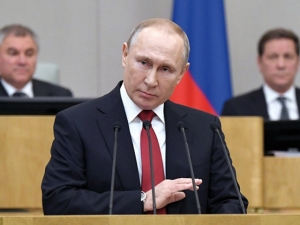Voters in Russia Back the Constitutional Changes, Allowing Putin to Stay in Power until 2036
The first of July marked the last day of voting for referendum changes in Russia that would allow Vladimir Putin, the current President of Russia, to continue his rule. The results show that Russian voters strongly backed the referendum that will make it possible for Putin to remain in power until 2036. The political opposition and an independent Russian election monitor group has, however, made claims that the government rigged the ballot.
The voting began on June 25 and ended July 1. Russia’s Central Election Commission reported that with most of the ballots counted, 78% of voters opted for “yes”, while the turnout was 65% of eligible voters. It has been reported that the biggest support for constitutional changes, above 90%, came from voters in Crimea, a region of Ukraine annexed by Russia in 2014, in Chechnya in the North Caucasus, and Tuva, in Siberia.
Up until the referendum, Putin was required to step down after 2024, the end of his current six-year term.
Although the Russian Parliament passed the amendments to the constitution weeks ago, Putin insisted on having the population approve his stay.
The referendum also consists of some 200 other amendments, including a ban on same-sex marriage and an affirmation of the Russian people's belief in God.
Some other changes, now passed by the parliament and the public, are designed to strengthen the country's State Council, plus a provision banning the relinquishing of any Russian territory. NPR’s Scott Neuman wrote that this was “a move aimed at solidifying Moscow's hold on Crimea.”
Putin was photographed voting at the Royal Academy of Sciences, where he was handed a ballot by a poll worker clad in mask and gloves as an apparent precaution against coronavirus infection, while Putin himself is not wearing any.
Putin’s presidency term limits will be reset to zero in 2024, and the Russian President, currently 67, could go on to serve well into his 80s. Putin is in his fourth term of presidency, first rising to power back in 1999. He served as the President of Russia until 2008, when he stepped down and served as Prime Minister for Medvedev for four years before winning the presidencial elections again in 2012 and serving since.
Modern Russian history has not seen a leader rule longer than Putin since Soviet dictator Joseph Stalin, who served as the general secretary of the Communist Party of the Soviet Union for thirty years, between 1922 and 1952.
The opposition accused the government of rigging the ballot, denounced the vote and claimed that the Russian President was aiming to be "president for life.” Putin has denied this.
The BBC reported that Golos, an independent Russian election monitoring group, noticed many violations of democracy in the referendum, one of them that, before the finalization of the voting process, “the internal affairs ministry said there had been no violations that could affect the result” (Interfax). However, Golos said it had received some 2,100 reports of possible violations.
The criticism includes: “opponents were barred from campaigning in the media; remote electronic voting was organized on an illegal basis; and election monitors were appointed by the Civic Chamber, a government body.”
The vote for the constitutional change was postponed from April 22 due to the coronavirus pandemic. However, the infection risk resulted in making it more difficult to monitor the legitimacy of the voting process in Russia.
By Nini Dakhundaridze
Source: NPR, BBC












